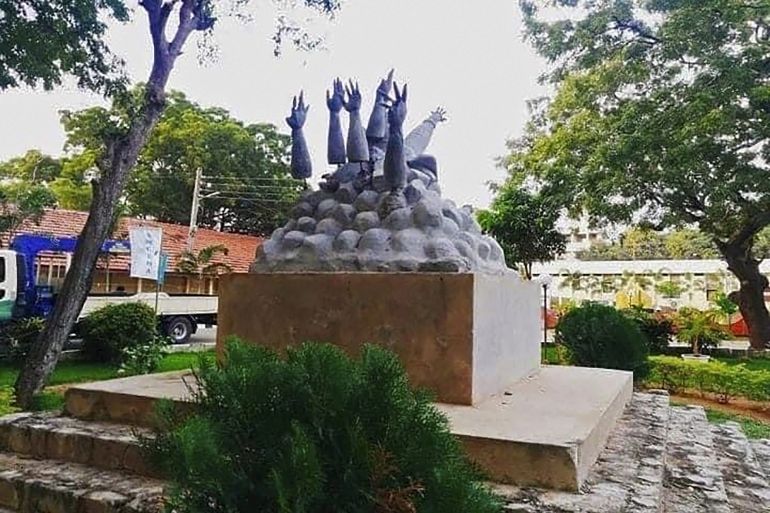Sri Lanka war memorial to be rebuilt after Tamils protest
Destruction of monument at Jaffna University – depicting arms sticking out of a mound – prompted protests and threats of general strike.

Sri Lanka’s government has said it would rebuild a memorial to Tamil civilians killed in the country’s civil war that was demolished at the weekend.
The destruction of the monument at Jaffna University – depicting arms sticking out of a mound – prompted protests and threats of a general strike in areas where Tamils are a majority.
Keep reading
list of 4 itemsIndia to prioritise Sri Lanka when COVID vaccine ready for export
Why Sri Lanka jailed a Muslim lawyer without charge for 6 months
Sri Lanka Parliament votes to strengthen presidential power
The government had earlier condemned the structure as a memorial to “terrorists”, saying it glorified Tamil Tiger fighters who were crushed in 2009 at the end of a 37-year-long war.
The memorial was erected by students at the university to mark the 10th anniversary of the end of the war and commemorate the thousands of civilians killed in the final stages.
Opposition legislator Dharmalingam Sithadthan told the AFP news agency that the university’s management had ordered its destruction.
“The gates were locked while a bulldozer demolished the memorial inside the university,” Sithadthan said. “Police were deployed outside for protection”.
The action angered students and residents as well as Tamils in neighbouring India.
Minority Tamils have accused the Sinhalese-majority government of denying them the right to remember their war dead.
#Students_Struggle_win 💪💪
The foundation stone is being laid at the demolished site..🙏🙏🙏The foundation stone for a memorial to replace the demolished Mullivaikkal memorial at the university was laid today Monday morning led by Vice-Chancellor & Hunger Strike came to an end pic.twitter.com/lbNAsQfCJ2
— Angajan Ramanathan (@AngajanR) January 11, 2021
Angajan Ramanathan, a ruling party legislator for Jaffna, on Monday said authorities had agreed to rebuild the monument at the same location.
“The foundation stone … was laid today,” Ramanathan said on Twitter.
Tamil Tigers controlled a third of the island at the height of their power but were crushed in a military offensive when President Gotabaya Rajapaksa was the top defence official.
His brother Mahinda, the current prime minister, was the president when Sri Lanka annihilated the Tiger leadership.
The military success was followed by allegations that up to 40,000 Tamil civilians were killed by security forces in the final onslaught, a charge the government denies.
Public Security Minister Sarath Weerasekera had earlier said the monument was a tribute to the Tigers and that “no one will and should be allowed to commemorate dead terrorists”.